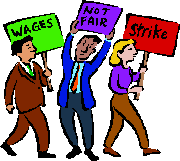A sort of CliffsNotes guide to understanding the minds of Democrats and Republicans:
Democrats and Obama said to Wall Street elites - "Unless your business model depends on bilking people, there's little to fear from these new rules." April 22, 2010
Republicans and Bush said to Wall Street elites - "This is an impressive crowd — the haves and the have-mores. Some people call you the elite. I call you my base." October 19, 2000
From the Labor Commission of the CPUSA, updates, information, news, analysis, and organizing materials in solidarity with workers of the world.
Friday, April 23, 2010
Thursday, April 22, 2010
Main Street, Wall Street and the Big Apple
In the city of New York there is a street named Wall and a district called Wall Street. The district is home to the influential financial interests of the American financial industry. There are banks, investment houses, stock exchanges such as the New York Stock Exchange (NYSE) and other related entities.
Confusing the picture further, a discussion about Wall Street can mean all, some or any one of those institutions.
Having cleared that up (?), lets consider the NYSE and the President’s financial-reform bill.
Today the prevailing attitude toward the NYSE is either one of love, for reasons obvious, or acceptance as a necessary evil.
There was a time when the NYSE and the lesser markets helped businesses raise capital to create new businesses and expand existing ones through the selling of stock and the marketplace of these stocks provided a "relatively" safe place for people to invest their earnings and savings.
The movers and shakers of the Exchange went to work every day dressed in their Brooks Brothers three piece suits and Johnson & Murphy wing tip shoes plying their skills, more or less efficiently, within the guidelines defined by government regulations that protected all the players – those in the business and those outside it. The hum it produced was audible – most of the time.
Now, today, after some 30 years of almost continuous deregulation of the entire financial industry, the NYSE has been taken over by a cabal of greed driven degenerates. Figuratively, if not literally, gold chains are worn over the Brooks Brothers suits and diamond pinky rings can be seen on hands that sign contracts. One can almost hear the ka-chings of cash registers and the oodly-oodly sound of slot machines as one passes by the Exchange's grand edifice.
Who of us does not know the story of the consequence of taking a bite of the forbidden fruit? That once done cannot be undone. Could it be that the NYSE took a bite of uncontrolled greed and corruption and cannot be made to turn back? That it will evermore resist, snarling and scratching, regulation that tries cure it of its drug-like addictions?
Perhaps Main Street should be asking if it is, now and evermore, worth the effort.
Perhaps the question Main Street should be asking is not what can be done to reform that piece of Wall Street known as the New York Stock Exchange but whether Main Street needs that piece of Wall Street known as the New York Stock Exchange.
Perhaps the call from Main Street should not be, "Fix it!", but, “Tear down that Wall Street casino and build a steel mill!”
Confusing the picture further, a discussion about Wall Street can mean all, some or any one of those institutions.
Having cleared that up (?), lets consider the NYSE and the President’s financial-reform bill.
Today the prevailing attitude toward the NYSE is either one of love, for reasons obvious, or acceptance as a necessary evil.
There was a time when the NYSE and the lesser markets helped businesses raise capital to create new businesses and expand existing ones through the selling of stock and the marketplace of these stocks provided a "relatively" safe place for people to invest their earnings and savings.
The movers and shakers of the Exchange went to work every day dressed in their Brooks Brothers three piece suits and Johnson & Murphy wing tip shoes plying their skills, more or less efficiently, within the guidelines defined by government regulations that protected all the players – those in the business and those outside it. The hum it produced was audible – most of the time.
Now, today, after some 30 years of almost continuous deregulation of the entire financial industry, the NYSE has been taken over by a cabal of greed driven degenerates. Figuratively, if not literally, gold chains are worn over the Brooks Brothers suits and diamond pinky rings can be seen on hands that sign contracts. One can almost hear the ka-chings of cash registers and the oodly-oodly sound of slot machines as one passes by the Exchange's grand edifice.
Who of us does not know the story of the consequence of taking a bite of the forbidden fruit? That once done cannot be undone. Could it be that the NYSE took a bite of uncontrolled greed and corruption and cannot be made to turn back? That it will evermore resist, snarling and scratching, regulation that tries cure it of its drug-like addictions?
Perhaps Main Street should be asking if it is, now and evermore, worth the effort.
Perhaps the question Main Street should be asking is not what can be done to reform that piece of Wall Street known as the New York Stock Exchange but whether Main Street needs that piece of Wall Street known as the New York Stock Exchange.
Perhaps the call from Main Street should not be, "Fix it!", but, “Tear down that Wall Street casino and build a steel mill!”
Subscribe to:
Comments (Atom)

